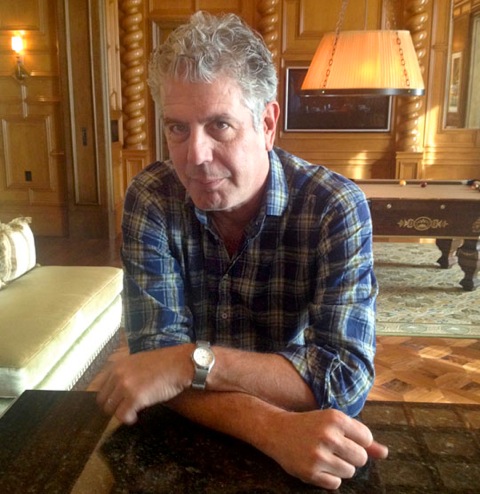A few months ago, in Vegas with Anthony Bourdain and the Parts Unknown crew, I had uncommonly sweet digs and a lot of downtime. Tony probably speaks with more chefs around the world than any other person living. So in between his facial and his pedicure, I talked to him:
M.R.: What issues do you see facing chefs today?
I think a number of chefs are trying to figure out how to be good citizens of the world, and also serve the one percent. Trying to find a balance when their whole business model is built up around expensive markup of bottles of wine, only the very best parts of the fish, the rest has to be disposed of one way or another.
A lot of chefs are trying to reconcile that. Chefs generally are good-hearted people. People like Eric [Ripert], he works closely with hunger relief and they try to do the best they can and try to do the best they can for the best directly as well as give food to City Harvest and places like that.
We're seeing a lot of chefs go local for a lot of reasons, because it's the good thing to do to try to keep the money in the area, because it's hip, because it adds value, people like seeing it on a menu.
It's better to give your money to an independently operating person in your area than to be giving your money to air freight and someone far away from your area and not feeding money back into it, that's preferable. I have no problem with people who get the best ingredients they can from all over the world, but I also admire people like Sean Brock, who are in a very real way trying to not just use local, but bring stuff that disappeared locally back, and to restore traditional foodways of the area that fell by the wayside as we entered the land of the tomato that was bred to travel.
You’ve been talking a lot about authenticity. What’s important to you here?
Who owns the food, who owns the recipe? Not intellectual property right. I mean, is it OK for a white guy to cook traditional northern Thai food and make money off it? There is some confusion. Is it OK for Paula Deen to make money off of traditional African American recipes? There's a discomfort level that's being discussed now. And I think on both these issues Roy Choi is at the center. As a chef, what are your responsibilities to your family heritage? Do you have a responsibility to preserve the integrity of Grandma’s Korean recipes even if you didn't grow up in South Korea? You may have grown up next to that food but you may have grown up next to Mexican food or Salvadoran food. To what extent do we need to respect the past, and restore it? Do chefs have any obligation at all to honor the classics?
I’ve always known your love of French classics, a love I share.
There's a lot to be said for respecting the classics, that maybe you should know how to make a coq au vin the right way, the way by consensus it should generally be made, before you deconstruct it or riff on it. But then again, food has always been in flux, you know? The story of food is the story of invasion, and migration, and oppression. The tomato in curry sauce was not really indigenous to India. Tempura is not indigenous to Japan. It's always changing. So that’s something people are talking about: What is authentic and do I owe anything to this notion of authenticity at all? People ask David Chang how does he describe his food, he says “tasty food.”
As a sentimental guy, and I think a lot of chefs are sentimental, people feel a certain respect and obligation to do it “the right way,” or at least recognizing the people who came before you and did it for years. I’d hate to see that get lost. No matter how tasty the new stuff is, I’d hate to see the old stuff go. French food, Italian food, Thai food.
I’m fine with any kind of riff, as long as it’s respectful, but even there, is there something wrong with Guy Fieri putting any two ingredients together and giving it a douchey name, and people like it? Probably not. I may find it distasteful, but is it immoral? It may feel immoral to me but I’m probably just being a snob about it.
We see this reverse snobbery now, in order to get the real stuff, you gotta go to some little strip mall on the outer fringes of Los Angeles, some tiny little place where the menus aren’t in English. That’s great but when you look at all the people who are sort of driving American cuisine right now, they’re all Korean American. And they don’t care. They may know what straight-up Korean food is but they sure aren’t cooking it.
And they’re pushing everything forward and they’re having an effect on the non Korean Americans. Eric Ripert is messing around with kimchi—how can that not be good?
Do you see any particularly knuckle-headed trends affecting American chefs?
I’m pretty positive about the way things are going. Even when you see people doing silly food—I overuse the Jimi Hendrix metaphor, but when he became really popular, a lot of people started to play like him, and a lot of them were unsuccessful at it, but it opened them up and they found their own thing. I think a lot of young chefs are making a lot of mistakes and doing a lot of food that they shouldn’t do, particularly in the Modernist cooking area, a lot of people are overreaching. But at the end of the day, when they settle down, they will probably have absorbed a lot of ideas and will apply them in a way that makes their food better. Just because you like Ferran Adrià doesn’t mean you should cook like him, but by the same token, it doesn’t mean a lot of those techniques won't be standard practice twenty years from now. A lot of them already are. A lot of them will fall by the wayside, but a lot won’t, and we wont think twice about meat glue or agar or spuma.
In Copenhagen, you see all these seafood bars, straight-ahead restaurants, casual eateries, but they’re using the ingredients and techniques they learned at Noma, in sensible ways that make things more delicious.
When you choose to be a chef, what are your obligations, if any?
Increasingly there are obligations. In my generation I don’t think there were, we didn’t think about any obligation. We were in the pleasure business, that was it. Your only obligation was to give your customers a good time at a price point they found reasonable. And you didn’t care where the tomato came from as long as it was a pleasure-giving tomato.
That dynamic has changed. Chefs think about that stuff now. Because the issues are raised and discussed within the community. Because chefs are either being pushed to be citizens of the world or are just naturally thinking about these things from the get-go. These were not issues we thought about back then.
What does sustainability mean to you and is it a real issue for chefs?
It means I’m enjoying serving this now and I’d like to be able to serve it in 25 years. I think even hardcore sushi chefs in Japan are saying, “Look, we have to cut back or there’s going to be no more of this.”
You have to think about that. It is an issue, and it should be an issue that chefs discuss. The extent to which you get on board is up to each individual chef, but again, without making it a mania. There’s always going to be a lot of hypocrisy and silliness, it’s easy to point a finger and say OK, they’re buying local but their refrigeration system alone is blowing a hole in the ozone layer the size of Michigan. They’re doing the best they can, on balance. People who are serious about food, spend a lot of time thinking about food, cooking it, serving it, writing about it, talking about it, they probably know more about the food and where it comes from and the footprint it leaves than they did ten years ago. The more you know about your meal as a chef and an eater, arguably the better. You can’t argue against it, even when it’s silly. Even when it's awkward or an affectation it's still on balance arguably good for the world.
Is it time for your pedicure?
It’s time for me to take your money on the pool table, Ruhlman.
Other links you may like:
- A few of my recent posts: Vegetable Porn and Dreaming of Gascony.
- Bourdain’s guest post: So You Wanna Be a Chef.
- Chef profiles on Melissa Kelly, Grant Achatz, and Rene Redzepi.
© 2014 Michael Ruhlman. Photo © 2014 Donna Turner Ruhlman. All rights reserved.




Very well said!
I love the fact that Anthony, in a discussion of chefs, still finds a way to bring up Paula and Guy and show his disdain for their popularity, and admits to his snobbishness. Warms my black little heart.
Also, I would dig a chance to wax both of you on a pool table someday.
Home sick with a dreadful cold and just finished reading Kitchen Confidential, you know how you reach for something familiar and comforting when you don't feel well. Go Tony go! Nothing pleases me like seeing a fellow misfit find his niche and flourish and grow. Keep up the good work, man.
And he got through the whole interview without one swear word! Good for you, Bourdain.
I love his techniques show, I think it was the No Reservations, where he makes beef bourguignon.
Some fucked up editing, because you have to fast forward throughout the entire show to see him make it in little segments
But it's a beautiful thing, making a fancy French meal for the common man to feed a large group economically.
And his wife's lasagna, she posted on Twitter, why doesn't he weigh as much as a Volkswagen?
I just read a little piece on Martha Haggerty yesterday including Tony Bourdain's support and defense of her. He even put his money where his mouth was which lent sincerity to it. I was beginning to think his level of snarkiness had become a little affected by expectations so I'm glad to see he does distinguish BS from reality. I think most chefs probably do, too. Food is a basic need and I admire the believers that start and/or get on board with the food movements that benefit everyone in some way (from the 1% on down) as long as they realize there are some limitations that real life deals to so many of us.
I wonder what both of you think today about pioneering chefs like Chef Tell Erhardt and Paul Prudhomme and their contributions to American cooking. Reading your article was like sitting in the same room and listening to a thoughtful conversation. Nice.
It's funny because I get a sense that Tony would really enjoy being a chef again now that not only is it a respectable profession but that we have so much to work with and a clear directive to hold up our kitchens as a community force for positive change. In my mind, it is this message that is our true legacy. After all the rest of what we do, if we have done our job right, is just a pile of shit at the end of the day. Thank You Tony, and Michael, for helping make it cool to cook.
Do yοu have a spam problem on this blοg; I also am a blogger, and I was wondering
your situation; many of us have created some nice methods and we are looking to exchange solutions with οther folks, please ѕhoot me an e-mail if interested.
Really interesting. I particularly enjoyed Bourdain's ponderings on whether or not we have an obligation to our heritage. Coming from a totally mixed bag heritage (and not knowing half of my genetic pool), I've always felt a bit untethered both personally and from culinary point of view. I guess that's why I like to cook food from many places - I guess I'm searching from some sort of connection (or heritage) I've never quite grasped.
Whenever I hear a chef talk about "authenticity", I tend to cringe a little bit. I believe that word is synonymous with "bullshit", to a degree. Does a dish that is authentic automatically make it good, or better? No. It serves as a topic; a near understanding of WHY the dish is prepared in such a way and contains specific ingredients. Respect can be given to the history of a dish, but it isn't necessary in creating good food. You first job as a chef is to please the customers. Your dishes can be as authentic or as inauthentic as you'd like, but if the food is bad, you've done a poor job as a chef.
My biggest problem with authenticity is one person's heritage or ethnic background may be incredibly strong and prevalent in their current life. But some of us (especially Americans) may not have had such a hard-wire connection to our "motherland". A mid-west American boy who grew up on corporate America fast-food should never be limited to that region, that flavor profile, and that mindset. He has every right to cook whatever the f*** cuisine he wants. He surely had no "responsibility" to honor the food of his upbringing.
By the way, who are we to criticize a New Jersey grandmother who prepares spaghetti, smothered in red sauce, under baseball-sized meatballs for serving an inauthentic dish? She's putting a piece of her story on the plate. Whatever recipes/preparations pre-dated this one may not be relevant in her current life.
No matter the color of your skin, your family background, or your current geographic location, you shouldn't be held back from preparing food that you like to eat (or would like to eat), let alone food that others enjoy, as well. To answer Anthony's questions...YES! There are no problems with a white man cooking northern Thai cuisine. Yes, it's ok for Paula to make money off those dishes. No, you do not have a "responsibility" to your heritage. You are only responsible for yourself.
P.S. GREAT POST!
Cool!
First or all congratulations for EGG! Love the cover.
I have to admit that every time I read Anthony, whether a publication of his own , I recognize my self in many forms. As Mexican cook in a California cuisine overcoming and enjoying all the swearing, sweating and grabbing ass of the guys performance on a busy night. Or in this great interview, by being one of the sentimental cooks that are trying to be better citizens of the world. I know I am just another serious cook among so many, that starts a blog and try to self-publish a cookbook (yes! I agree what a silly idea)
I know you are busy guys… but hey! You may find a second to click the link and transport your self through the video into a very special Paradise in the Mexican Pacific Coast where we are trying to do tasty food.
Gracias…Your words make a difference in my life!
https://www.kickstarter.com/projects/1446528763/cooking-in-paradise-cocinando-en-el-paraiso?ref=discovery
As a working chef (not a flowery tv personality with outlets in Vegas and NY or any other entity that flings the title 'chef' around with abandonment or actually working a line) this is perception not reality. Every time Tony speaks a piece of my heart dies and turns black. He made me a fan from Kitchen Confidential but he continues these rants on Rachel Ray/ Paula Dean types is growingly transparant because he knows that is just what he has become. No shame in it. Just go quietly into the night...
Crystal Fox
Executive Chef, Philadelphia PA
Good post. I used to be verifying frequently this kind of blog page for fascinated! Invaluable information especially the ultimate portion 🙂 I actually handle such information considerably. I had been interested in this type of information for an extended time. Thank you along with all the best ..
Tall and Tanned, I watched as one of my favorite chefs walked right by me on a beach in Southampton, NY last summer. With his beautiful young daughter in tow, they seemed to be having a great time.
I wanted to hug him, tell how much I loved all the books and t.v. shows, how much I have learned from him, how appreciative I was for his insights and how I loved his humor. I was awash with glee. However I am also a native New Yorker from Manhattan and that is not how we natives roll. I just allowed my eyes to watch and take in the delicious view.